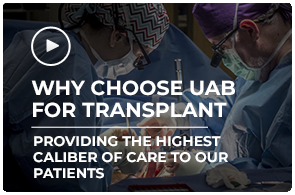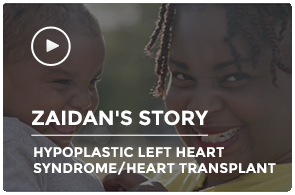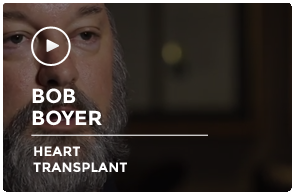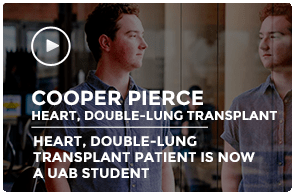A heart transplant is a procedure in which a damaged or diseased heart is replaced with a healthy one, typically in patients with advanced heart failure, a condition that prevents the heart from effectively pumping blood through the body. Common conditions that can lead to advanced heart failure and heart transplantation include coronary heart disease, damaged heart valves or muscles, heart rhythm problems (arrhythmias), congenital heart defects, and viral infections of the heart. A heart transplant typically is performed only when other treatment options have failed, and most recipients are able to return to normal activity levels after recovering from the surgery.
The UAB Heart Transplant Program has evolved into one of the most distinguished programs of its kind in the nation since the first heart transplant in the Southeast was performed at UAB in 1981. Building on that groundbreaking achievement, hundreds of heart transplants have been performed at UAB since that time. Our long history of success is centered on our highly skilled transplant team, dedication to patient care, and continued commitment to pioneering advances in heart transplantation.
Our Heart Transplant Program has achieved worldwide recognition due to our outstanding patient survival rates and skilled cardiologists and surgeons, who are recognized leaders in the treatment of cardiac disorders. Heart transplant patients receive exceptional, comprehensive, and collaborative transplant care from an experienced team of specialists that also includes nurses, dietitians, transplant coordinators, mental health professionals, and transplant social workers. Our patients have access to educational material and teaching sessions – including classes and supportive face-to-face discussions – during each phase of the transplant process, which reduce patient anxiety so they can look ahead to the future.
One of our most unique and innovative features is the Heart Transplant Intensive Care Unit (HTICU). This state-of-the-art 23-bed unit – one of only a few of its kind in the nation – is staffed with a skilled critical care team dedicated to caring for heart transplant patients in the crucial first hours after surgery. The unit received the Beacon Award for excellence in critical care nursing.
Each year, UAB Medicine implants a number of mechanical circulatory support devices as a short-term fix for patients awaiting heart transplants. In 2005, UAB was one of the first transplant centers in the nation to implant the Berlin Heart, a mechanical circulatory support device named for its origin. The device successfully extended the life of a 17-month-old child for six weeks until a heart became available for transplant. With this groundbreaking achievement, UAB further established its standing among the best and most advanced transplant centers in the United States.
Videos
Resources
- UAB Cardiovascular Surgery Patient Guide 2022
- Transplant Recovery at Hilton Birmingham at UAB
- Heart Transplant Patient Information
- UAB Division of Cardiovascular Disease
- UAB Division of Cardiothoracic Surgery
- UAB Division of Transplantation
- Comprehensive Transplant Institute
- Transplant Living
- Heart Transplantation
Related Specialties
Clinical Trials
Speak to your physician about your options and browse the link below for more information
Latest News
View All News-
UAB celebrates milestone with 3,000 adult liver transplants
September 26, 2024
-
Hope restored: Georgia woman receives heart-double lung transplant thanks to organ donation, family
September 20, 2024
-
UAB’s Porrett awarded R01 grant from the NIH for uterine transplantation research
July 15, 2024
-
Heart and kidney transplant patient defies odds and delivers baby at UAB Hospital
February 6, 2024
-
New study: Pig kidneys — for the first time — demonstrate “life-sustaining kidney function” in a human
August 16, 2023








